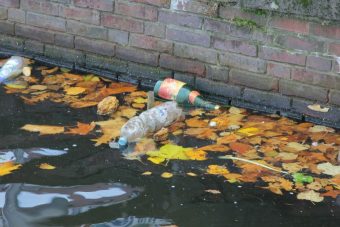
Under the rubric of the Let’s Do It campaign, Albanian and Kosovar activists jointly cleared their border area and the polluted Lake Vermica last April, in a Wombles-style campaign that has involved more than 5% of Albania’s population, and 7% of Kosovo’s.
Even more impressively, almost 14% of Slovenia’s population was mobilised to clear illegal landfills in the world’s largest action of its kind four years ago. Trash activists in Romania too claim to have created the biggest national civic movement since the revolution.
Jaka Kranjc, a spokesman for Slovenia’s Ecologists Without Borders said that the symbol of waste left by past generations had a special meaning in the region.
“The best thing about this movement is that it bridges borders and breaks national barriers,” he said. “When Bosnia had a clean up, they had to talk to several regional administrations and all the minorities cooperated, even though the country had been a war zone just ten years ago.”
Bosnia is one of several Balkan countries that now has annual clean up actions. In Albania, the issue has become so fashionable that events are now organised every six months.
One of the few Balkan countries not well represented in the clean up campaign is Serbia, even though it was represented at the 2011 conference, which first brought the region’s activists together.
“Serbian volunteers started preparing their actions afterwards but then the government realised this was a good idea and hijacked it,” Kranjc said. “The activists were shut out and it turned into a one-off public programme that was never repeated.”
Since its inception in Estonia in 2008, Lets Do It claims to have mobilised over 16m people in 113 countries. Its next global clean up planned for September 2018 could exceed even those high numbers.
Sitting outside a cafe in Zagreb, Helena Traub, a Croatian waste activist, told the Guardian that the mobilisation would be “the greatest cleanup event yet”.
“Institutions are not enough.” she said. “The importance of civic movements is that they educate. When people really put their hands in the dirt, they realise what they are dealing with.”
School students made up most of the 55,000 volunteers who helped clear an estimated 37,000 tonnes of rubbish from forests, rivers, mountains and beaches in Croatia four months ago.
Recovered items from popular land cavity dump sites included sofa’s, unexploded ordnance and, in Zagreb last year, even a dead body, Traub said.
Not all waste reduction activism is so organised.
In the village of Litoric on Croatia’s forested border with Slovenia, Igor Barbara has just returned from his daily trip to scatter past-expiry date bananas, watermelon and apples for the brown bears and other animals which roam his territory.
“We put food out for the bears every day,” he said. “We have automatic feeders that dispense food every month and we also do planting and seeding and we secure peace in this area from poachers.”
The head of the local Jelenski Harak hunting club, Barbara describes himself an environmentalist and the 2m tonnes of food that he gleans from local supermarkets, are his weapons in the war against food waste.
“Annually we get around two tonnes of food for the bears, wild boars, red deer and roe deer to eat. This is just a supplement to what these animals can find in the forest, but it prevents problems between villagers and bears,” he said.
Wild boars have caused the biggest headache for local people but two young male bears also sparked alarm this summer, after raiding garbage bins left outside houses. Scared villagers reacted by calling hunters, who shot one of the animals.
“A good way to prevent the bears from coming into the villages is to leave apples out for them in the forest,” Barbara said.
Source: theguardian.com



